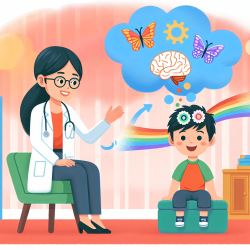Introduction
In the realm of speech-language pathology, practitioners are continually seeking innovative strategies to enhance the developmental outcomes of children. One such promising avenue is the integration of findings from urban health research, particularly those highlighted in "The Tsinghua–Lancet Commission on Healthy Cities in China: Unlocking the Power of Cities for a Healthy China." This research underscores the pivotal role cities play in shaping health outcomes, offering valuable insights for practitioners aiming to foster healthier environments for children.
Key Insights from the Research
The research emphasizes the importance of integrating health into all urban policies, a concept that can be translated into actionable strategies for speech-language pathologists working with children. By understanding the environmental and social determinants of health, practitioners can tailor their interventions to address specific urban challenges. Here are some key takeaways:
- Environmental Influence: Urban environments significantly impact children's health and development. Practitioners should consider environmental factors such as air quality and access to green spaces when designing intervention strategies.
- Intersectoral Collaboration: The research advocates for collaboration across sectors to address health challenges. Speech-language pathologists can benefit from partnering with educators, healthcare providers, and urban planners to create holistic intervention plans.
- Community Engagement: Increasing community participation in health management is crucial. Practitioners can engage families and community groups to support children's language development in diverse settings.
Implementing Research Outcomes
To implement the outcomes of this research, practitioners can adopt a systems approach to urban health management. This involves recognizing the interconnectedness of various factors influencing child development and leveraging data-driven decisions to optimize outcomes. Here are some practical steps:
- Conduct Environmental Assessments: Evaluate the environmental conditions affecting children in urban settings and adjust intervention strategies accordingly.
- Promote Interdisciplinary Collaboration: Work with professionals from different sectors to address the multifaceted needs of children in urban environments.
- Advocate for Policy Changes: Use research findings to advocate for policies that support healthy urban environments conducive to child development.
Encouraging Further Research
The findings from the Tsinghua–Lancet Commission highlight the need for ongoing research to understand the complex dynamics of urban health. Speech-language pathologists are encouraged to engage in or support research initiatives that explore the relationship between urban environments and child development. By contributing to the body of knowledge, practitioners can help shape interventions that are both effective and sustainable.
Conclusion
The integration of urban health research into speech-language pathology practice offers a promising pathway to enhance the developmental outcomes of children. By leveraging the insights from "The Tsinghua–Lancet Commission on Healthy Cities in China," practitioners can adopt a holistic, data-driven approach to intervention, ultimately fostering healthier environments for children to thrive.
To read the original research paper, please follow this link: The Tsinghua–Lancet Commission on Healthy Cities in China: unlocking the power of cities for a healthy China.










